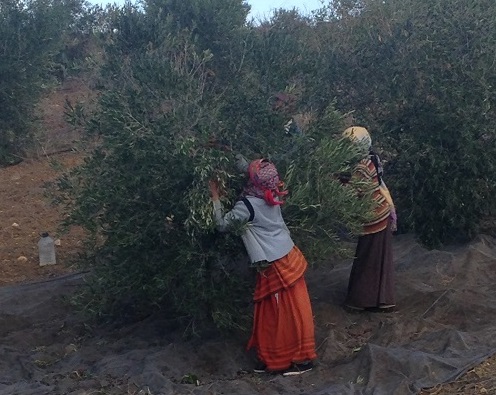Greater public private dialogue key to stronger Tunisian olive oil sector

Tunisia is the world’s third largest exporter of olive oil, after Spain and Italy. But staying competitive in a crowded global market requires improving productivity, efficiency and olive oil quality. Production and price volatility also create a challenging environment for Tunisian producers.
The Food and Agriculture Organization of the United Nations (FAO) and the European Bank for Reconstruction and Development (EBRD) organized a one-day event in Tunis on 7 March along with the Ministry of Agriculture, Water Resources and Fishing. The conference was attended by more than 60 public and private industry players from across Tunisia to discuss how to drive the sector forward.
During the conference, the Tunisian Government underscored its commitment to bringing the private sector to the table to build a more competitive, inclusive and sustainable olive oil sector.
“Olive oil is vital to our nation’s economy, and the private sector has an important role to play, particularly in the policy discussions that will shape the future of our industry,” said Chokri Bayoudh, Director-General of Tunisia’s Office National de l’Huile.
Addressing bottlenecks
To facilitate greater public private dialogue, FAO and the EBRD have been supporting a working group of Tunisian olive growers, olive oil processors, exporters, government officials and trade union representatives since September 2015.
The working group’s objective is to make concrete proposals to strengthen the sector’s organization, including better infrastructure and market information systems and improved access to credit, particularly for small and medium-sized producers.
Tunisia currently exports most of its olive oil in bulk, although the share of bottled oils is on the rise. By moving toward higher value-added products, including a greater share of bulk extra-virgin, more bottled oils, organic olive oils and origin-based labels, and improving the quality of its oils through traceability and certification, it could tap into new markets at home and abroad.
The working group has drawn on how Spain and Italy have overcome similar challenges to build a common vision for their respective olive oil sectors. “There’s a lot potential here in Tunisia. We were definitely inspired by the model we saw in Italy last year, especially how well coordinated the olive oil actors are along the value chain, and how companies, small and large, successfully promote their high-quality olive oils throughout the world,” said Raouf Ellouze from the Chambre National oléiculteurs.
He was referring to the November 2016 knowledge exchange to Italy’s Apulia region, organized by FAO and the EBRD for a group of Tunisian and Moroccan public and private industry actors. The conference in Tunis was an opportunity to take stock of these issues and work together to find practical solutions to advance the industry’s interests.
“Industry players and consumers alike stand to gain from a stronger, more efficient olive oil industry in Tunisia,” said Iride Ceccacci, EBRD Principal Economist. “Assisting the Tunisian Government in elaborating its long-term olive oil sector strategy will help us target our investments better for a more robust sector, and also support smaller producers to develop and grow.”
Building industry consensus
Cooperation and communication are the cornerstones of the working group – and essential building blocks for a healthy and competitive olive oil industry.
The Tunisian Government welcomed the working group’s input, as well as this process of open and constructive dialogue on how best to realize the sector’s potential.
Next up is for the working group to make proposals on how to create a well-functioning inter-profession and present those findings to the Government by the end of the year.
Lamourdia Thiombiano, FAO’s Subregional Coordinator for North Africa, reiterated FAO's commitment to support this strategic sector for Tunisia: "This commitment is included in the new 2016-2020 Programming Framework signed between FAO and Tunisia, and to capitalize during the second phase of our collaboration on the results already achieved, it is proposed to contribute to the development of a national olive oil strategy with the objectives of improving the value added and strengthening the competitiveness and sustainability of the sector ".
FAO and the EBRD will continue to support these efforts, which are part of a larger FAO and EBRD regional initiative to improve food quality standards and efficiency in Tunisia and Morocco.
“Building industry consensus through public private dialogue on everything from raising productivity and quality standards to opening up new market opportunities is what will move Tunisia’s olive oil industry forward to the benefit of all,” said Lisa Paglietti, FAO Economist.
